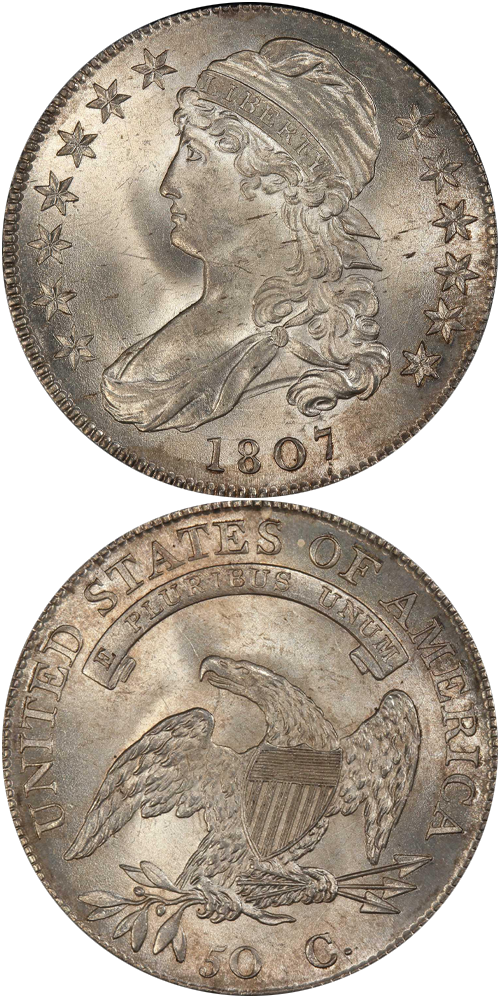1807 Capped Bust Half Dollar
Large Stars
The John Reich design revolution began in 1807 with half dollars and half eagles, but eventually expanded to include every series but eagles and dollars, two denominations that endured a production lapse that would extend to the late 1830s. Reich's relationship to the U.S. Mint dates to 1801, when Chief Coiner Henry Voigt purchased the remainder of Reich's indenture, a term of servitude that would have enabled Reich to pay for his voyage from Bavaria to Philadelphia with a guarantee of future labor. Mint Director Elias Boudinot wrote to Thomas Jefferson in June 1801 that Reich "has been liberated from his servitude by means of one of the officers of the Mint, since which I have set him to work on a particular medal to be ascertained of his abilities. I am obliged to use great precaution in regard to employing him in the Mint before I can have good evidence of the integrity of his character." The medal mentioned by Boudinot is likely Jefferson's Indian Peace medal, though soon thereafter Reich began work on the project that would attract Jefferson's more specific attention: a privately commissioned medal to commemorate both Jefferson's inauguration and the 25th anniversary of the Declaration of Independence. Jefferson was so pleased with it that he sent one to each of his daughters, writing to Martha "I inclose you a medal executed by an artist lately from Europe and who appears to be equal to any in the world," noting further that "it sells the more readily as the prints which have been offered the public are such miserable caricatures."
The next several years of Reich's career were mostly spent on odd jobs, engraving now-forgotten seals and dies for better-remembered medals, including government-sponsored projects, like the naval medals for commodores Thomas Truxtun and Edward Preble, and private commissions, led by the four medals depicting George Washington and Benjamin Franklin that were executed as part of Joseph Sansom's abortive Medallic History of the American Revolution series. He was finally hired full time by the Philadelphia Mint on April 1, 1807, with the title of assistant engraver and a salary of $600 per annum. The designs for the 1807 Capped Bust half dollars were among the first works he completed in his new position, though he completely re-envisioned and created the designs for the new half eagles in the same year. In 1808, Reich redesigned the cent and the quarter eagle; the year following, his talents brought forth new images of Liberty on the half cent and dimes. After 1807, no quarter dollars were struck until 1815, but when they appeared those too were struck from new designs by Reich, completing his total overhaul of American coinage. Though he left the Mint in 1817, when the half dime reappeared in 1829, it likewise displayed motifs copied from the work accomplished during his decade of active production. Stewart Witham, a Capped Bust half dollar specialist and Reich biographer, estimated that during that decade Reich "executed at least 270 different coin dies, obverses and reverses." It is no wonder that the specialty club devoted to collecting the coins of this era selected the name John Reich Collectors' Society.
The example to the left was sold by Stack's Bowers Galleries in the D. Brent Pogue Part II Auction, where it realized $258,500.






